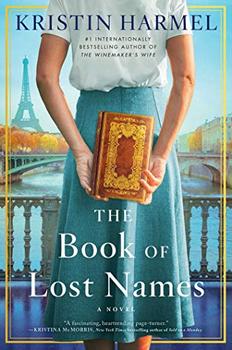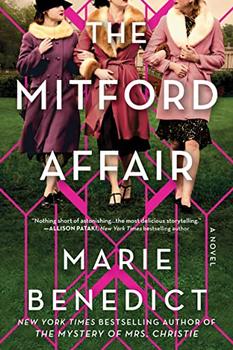Summary | Excerpt | Reading Guide | Discuss | Reviews | Beyond the book | Read-Alikes | Genres & Themes | Author Bio

Inspired by an astonishing true story from World War II, a young woman with a talent for forgery helps hundreds of Jewish children flee the Nazis in this unforgettable historical novel from the New York Times bestselling author of the "epic and heart-wrenching World War II tale" (Alyson Noel, #1 New York Times bestselling author) The Winemaker's Wife.
Eva Traube Abrams, a semi-retired librarian in Florida, is shelving books one morning when her eyes lock on a photograph in a magazine lying open nearby. She freezes; it's an image of a book she hasn't seen in sixty-five years—a book she recognizes as The Book of Lost Names.
The accompanying article discusses the looting of libraries by the Nazis across Europe during World War II—an experience Eva remembers well—and the search to reunite people with the texts taken from them so long ago. The book in the photograph, an eighteenth-century religious text thought to have been taken from France in the waning days of the war, is one of the most fascinating cases. Now housed in Berlin's Zentral- und Landesbibliothek library, it appears to contain some sort of code, but researchers don't know where it came from—or what the code means. Only Eva holds the answer—but will she have the strength to revisit old memories and help reunite those lost during the war?
As a graduate student in 1942, Eva was forced to flee Paris after the arrest of her father, a Polish Jew. Finding refuge in a small mountain town in the Free Zone, she begins forging identity documents for Jewish children fleeing to neutral Switzerland. But erasing people comes with a price, and along with a mysterious, handsome forger named Rémy, Eva decides she must find a way to preserve the real names of the children who are too young to remember who they really are. The records they keep in The Book of Lost Names will become even more vital when the resistance cell they work for is betrayed and Rémy disappears.
An engaging and evocative novel reminiscent of The Lost Girls of Paris and The Alice Network, The Book of Lost Names is a testament to the resilience of the human spirit and the power of bravery and love in the face of evil.
Every character in the novel is well-rounded and clearly defined, if a little one-dimensional. The plot is a bit reminiscent of a Disney movie, however; the main characters are good people with small interpersonal dramas and there is a looming villainous presence. Nothing here is narratively complicated or heavy, even given the wartime setting and high political stakes. Despite these gripes, The Book of Lost Names is a pure kind of novel. It works spectacularly as a love story; its characters are lovable and easy to bond with. The highs and lows all hit hard because of the tight pacing...continued
Full Review
 (632 words)
(632 words)
(Reviewed by Will Heath).
 While Eva, the gifted young Jewish forger in Kristin Harmel's The Book of Lost Names, may be a fictional character, the work she did and the risks she took were realities during World War II. Two of the more notable forgers — heroes who saved hundreds of Jewish lives — were Adolfo Kaminsky (1925-) and Alice Cohn (1914-2000).
While Eva, the gifted young Jewish forger in Kristin Harmel's The Book of Lost Names, may be a fictional character, the work she did and the risks she took were realities during World War II. Two of the more notable forgers — heroes who saved hundreds of Jewish lives — were Adolfo Kaminsky (1925-) and Alice Cohn (1914-2000).
Adolfo Kaminsky's story is a fascinating one. A Jew living in occupied France, Kaminsky joined the French Resistance as a forger at age 17. It is estimated that he and his fellow Resistance members saved the lives of 14,000 Jewish people using forged documents. As his biography (written by his daughter Sarah) chronicles, Kaminsky didn't stop at the end of the war. He continued to support causes all over ...

If you liked The Book of Lost Names, try these:

by Derek B. Miller
Published 2025
From the Dagger Award–winning author of Norwegian by Night comes a vivid, thrilling, and moving World War II art-heist-adventure tale where enemies become heroes, allies become villains, and a child learns what it means to become an adult—for fans of All the Light We Cannot See.

by Marie Benedict
Published 2023
From New York Times bestselling author Marie Benedict comes an explosive novel of history's most notorious sisters, one of whom will have to choose: her country or her family?